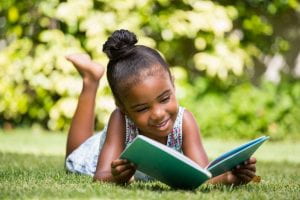 Kids in the U.S. are well into the lazy days of summer.
Kids in the U.S. are well into the lazy days of summer.
Summer vacation – and in some cases, distance learning that felt like summer vacation! – started early this year for many youths when schools closed to slow the spread of the corona virus. For most kids, summer vacation marks a time when they are less engaged in educational pursuits like reading, math and problem solving. And with camps and day cares closed in many parts of the country, more kids than ever are spending extra time at home, and likely in front of screens.
For decades, the general research consensus has been that summer vacations lead to a “summer slide,” where students forget some of what they learned over the previous school year. A systematic review of 39 studies published in 1996 found summer learning loss equaled about one month of classroom learning, and students tended to regress more in math skills compared to reading skills. It also found that students from middle- and upper-class families improved in reading over the summer, while students from lower-income families regressed.
But emerging research on the “summer slide” calls into question these findings. A more recent study finds that the years before kindergarten lead to the greatest inequality in children’s school performance, and this gap shrinks in the early years of elementary school, even with summer vacations. This study also points out flaws in the original research that established this “summer slide.”
A study published last year in the journal Phi Delta Kappan take a more careful look at this issue by analyzing data from more than 3.4 million students in all 50 states who took the same reading and mathematics assessments between the 2016-17 and 2017-18 school years.
The analysis still found that students lost some of what they learned the previous school year. The typical student loss one to two months of learning in reading and one to three months of learning in math. But the analysis demonstrated that the strongest predictor of whether a student would experience summer gains or losses was how much progress the student had made in the previous academic year. Students who learned more during the school year were more likely to lose ground during summer break.
In addition, in the new study, race and ethnicity only accounted for one percent of summer learning loss. Students in higher-poverty schools did show significantly more loss during the summer in later elementary and middle school, but only by about one week of school learning.
The good news is, there is evidence that parents and school can take steps to reduce and even eliminate the “summer slide.”
According to a paper published in 2015 in the Journal of Organizational and Educational Leadership, there are three keys to reducing summer losses in reading: Targeting the students who are most likely to regress, creating a routine that requires students to practice every day and building strong relationships between kids and their parents or teachers.
article continues after advertisement
In another study published in 2017, 6- and 7-year-olds who participated in a structured reading program at their local YMCA over the summer showed no signs for summer reading loss.
The evidence is clear: Children do forget skills and knowledge learned in the previous school year, and research is telling us more about the factors that contribute to those losses. But if families and educators encourage kids to stay engaged in learning throughout the summer, students may not only maintain, but improve their knowledge.



Speak Your Mind